Omagh bomb inquiry first hearing begins
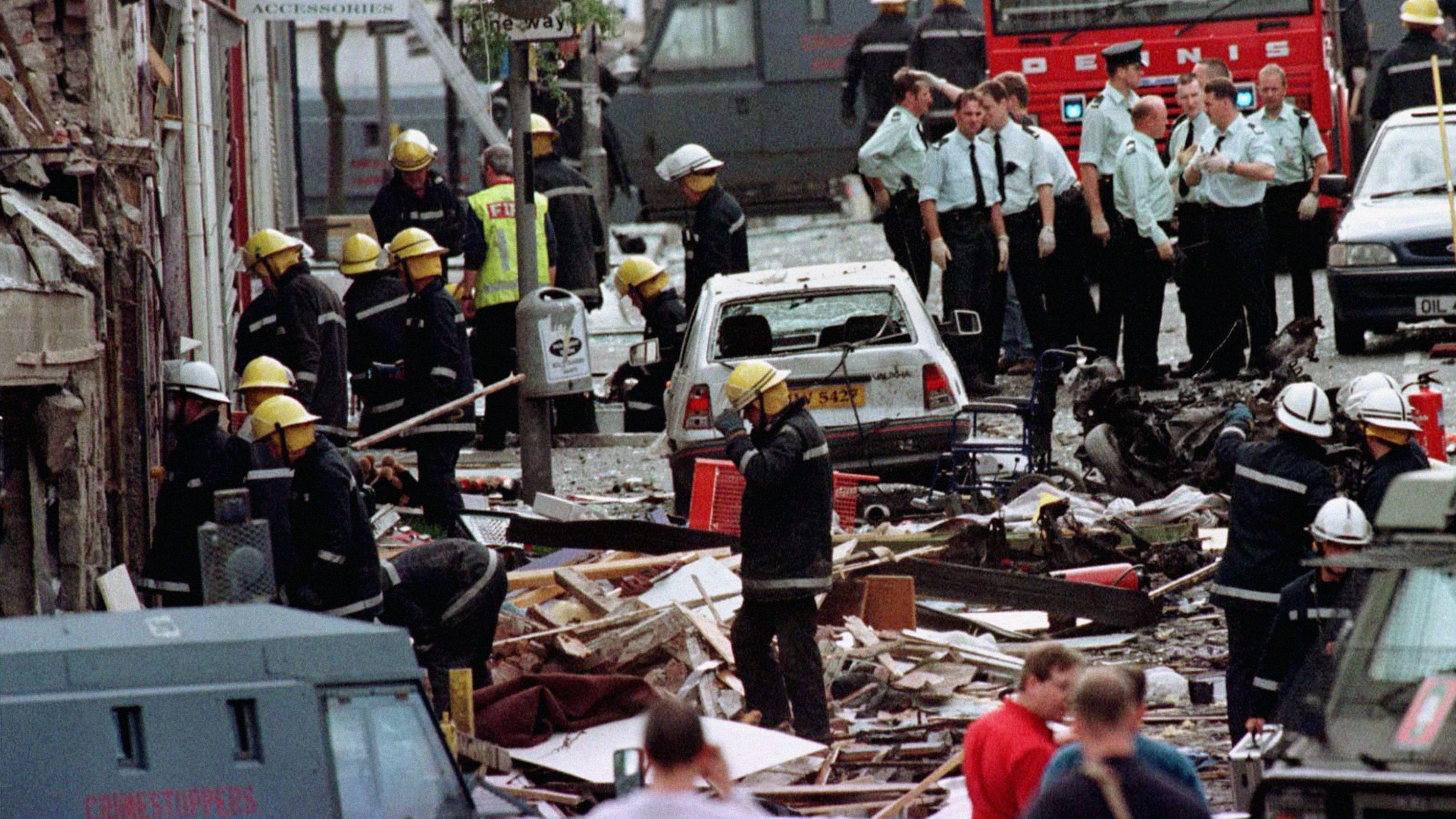
The explosion in Omagh's town centre in 1998 killed 29 people
- Published
The Omagh bombing inquiry has opened, with its chairman Lord Turnbull promising it will undertake its task “rigorously and fearlessly”.
It will examine whether the worst atrocity of the troubles could have been prevented.
In his first remarks, Lord Turnbull said the trauma caused by the bombing “has been enduring and continues to have a most powerful impact”.
After the names of those murdered were read out by an inquiry lawyer, a minute’s silence was held.
Twenty-nine people, including a woman expecting twins, were murdered in the Real IRA attack on 15 August 1998.
The inquiry was established last year, following a long legal battle by some victims’ families.
Inquiry lawyer Paul Greaney KC said the inquiry is “grateful” for the Irish government committing to assist its work.
He said discussions had taken place with Dublin officials and An Garda Siochana (Irish police).
Mr Greaney said it is hoped written agreements can soon be put in place.
He added the arrangement would “make certain the inquiry has full access to any relevant materials and has the ability to obtain statements and call witnesses.”
'Ensure nothing is left unanswered'
The Irish government told the Omagh bombing inquiry it will do everything in its power to help.
A statement was read out during proceedings by one of its Department of Foreign Affairs officials, Ruairi de Burca.
He said assistance “will be grounded in law to support concrete action”.
Mr de Burca added: “The government is committed to put in place additional new legislation, if that is what is required, to support our assistance to the Inquiry.
“These important details are being worked through with the inquiry team, to ensure that our engagement proceeds on the strongest possible footing.
“Our commitment is to ensure that there is nothing left unanswered in our jurisdiction at the end of the inquiry.”
Dublin has previously faced criticism for rejecting calls to establish its own public inquiry into the bombing from some victims’ families.
'Today is hugely significant'
Prior to the first hearing, Michael Gallagher, whose son Aiden was one of those killed in the bombing, said the inquiry was hugely important.
"As I got up this morning and I could see the sun streaming through the window that just reminded me of 15th August 1998," Mr Gallagher told the Good Morning Ulster programme.
"It was a beautiful day like today when the bombers came to Omagh.
"Today is hugely significant – it’s hopefully the beginning of the end, as a bereaved parent I have done all that I can and the families are just totally exhausted."
He said the bombing was "the largest security and intelligence failure in the history of Northern Ireland and there needs to be answers, what went wrong.
"There’s no doubt it will be difficult and not just difficult for us, but it will also be difficult and embarrassing for the British government and the Irish government because both states have failed us.
"I may have got this wrong, but what I would say to people is that if I have got it wrong please show me where I have got it wrong. We need to bring this finally to an end."
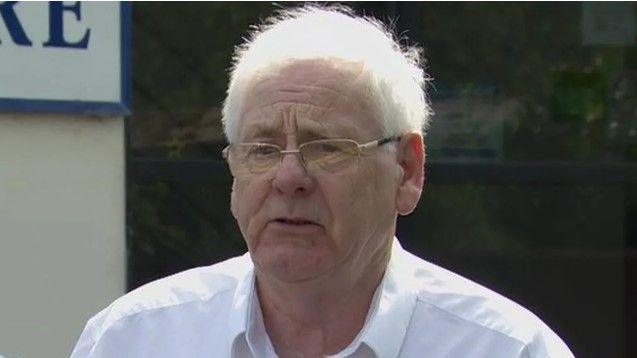
Michael Gallagher, whose son Aiden was one of the victims, hopes the inquiry "is the beginning of the end"
Speaking on Tuesday afternoon, Mr Gallagher said proceedings so far "went a lot better than we thought".
He said there was "good, positive engagement" by the Irish government, adding: "That's really what we need; we need everybody engaging."
Mr Gallagher said the work the inquiry has done so far is "really good".
"They've made requests for information from all the relevant government authorities," he said.
He added: "What we ultimately want is that the chairman can interview and get whatever documents he requires from the Irish government.
"The inquiry will work well if there’s open access by the Irish government. Everything looks hopeful at the moment, and we’re staying positive on it."
Public hearing
Bereaved families and survivors attended the public hearing at the Strule Arts Centre in the town.
It is described as a preliminary session to deal with procedural issues.
No witnesses will be called or evidence heard until next year.
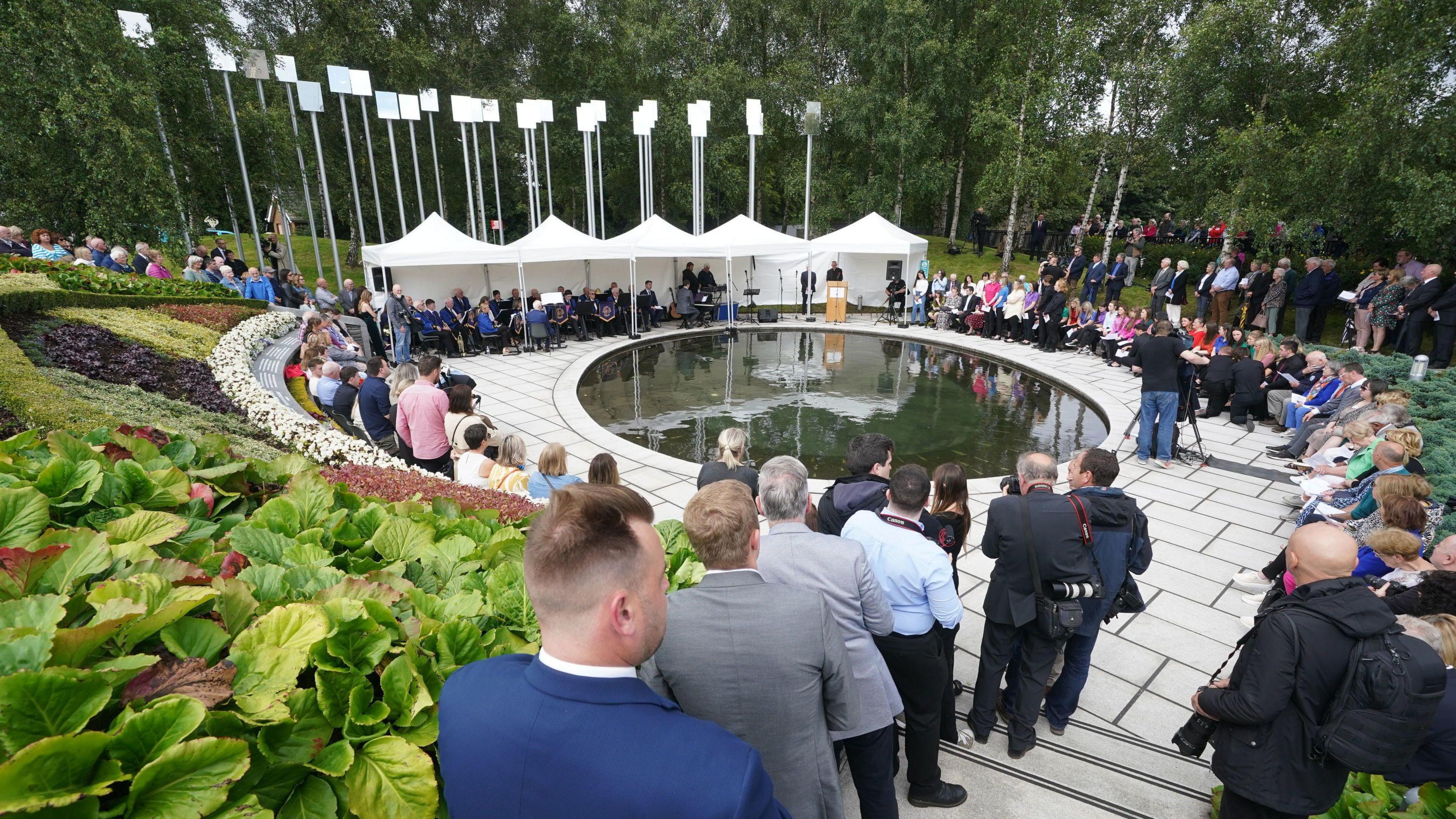
Victims families have campaigned for an independent statutory inquiry into the Omagh bombing
Part of the inquiry’s remit will be to establish if security measures could have disrupted dissident activities in the run-up to the bombing.
It will also evaluate the intelligence picture.
But it is not its purpose to identify the individuals responsible.
The attack was mounted from the Republic of Ireland and the Irish government has promised to assist the inquiry.
However, it has rebuffed a call for a separate or joint public inquiry.
Omagh bomb: Timeline of families' bid for justice
- Published28 January
Omagh bomb: The 29 victims
- Published28 January
The South East Fermanagh Foundation (SEFF), a group which helps some Omagh victims, has questioned Dublin’s approach.
Its director, Kenny Donaldson, said: "The Irish government could pass legislation which would provide Lord Turnbull with the ability to hold inquiry sessions in Dublin.
“He could be afforded the power to compel witnesses, to summons them to attend and to produce documents.
“Neither the Taoiseach (Irish PM) nor the Tánaiste (Irish deputy PM) can enforce key individuals to do so.
"An inquiry into Omagh which fails to have the ability to compel and summons witnesses from both sides of our border will not achieve an honourable and just outcome.”
What was the 1998 Omagh bombing?
On 15 August 1998 - just months after the signing of the Good Friday Agreement - a large car bomb exploded in the town's main street during peak Saturday shopping.
More than 200 people are injured in the blast, and a further 29 people died as a result.
Among the deceased were three generations of the same family.
The three women from Augher, County Tyrone were a 65-year-old, her 30-year-old daughter, who was heavily pregnant, and her 18-month-old toddler.
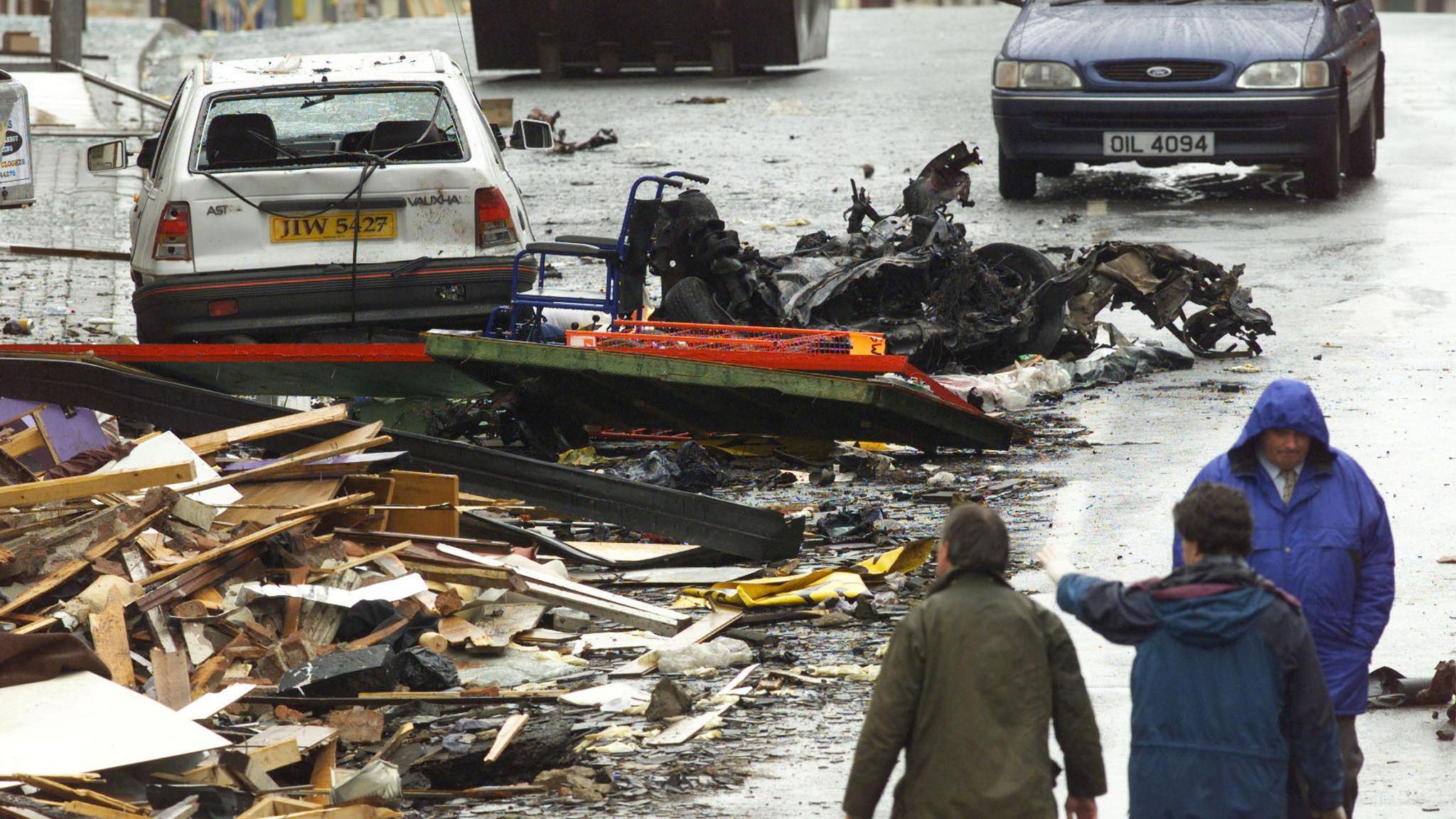
The attack happened just months after the Good Friday Agreement was signed
Three days after the attack, the Real IRA claimed responsibility.
The recently formed dissident republic group said its targets were "commercial" and apologised to "civilian" victims.
No one has ever been convicted for the bombing, however, Real IRA leader Michael McKevitt was found responsible in a 2009 civil case.
Three other men, Liam Campbell, Colm Murphy and Seamus Daly were also found liable for the attack.
- Published30 April 2024
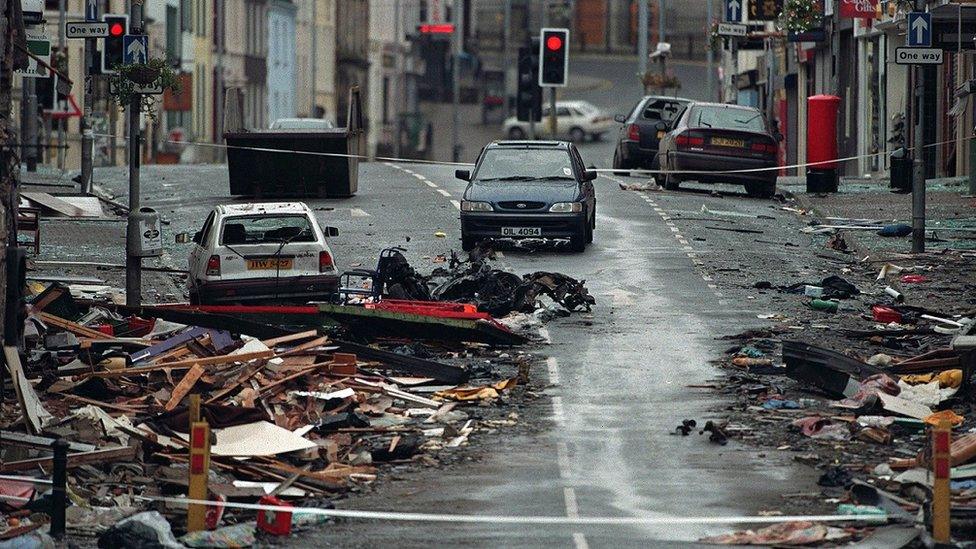
- Published2 February 2023
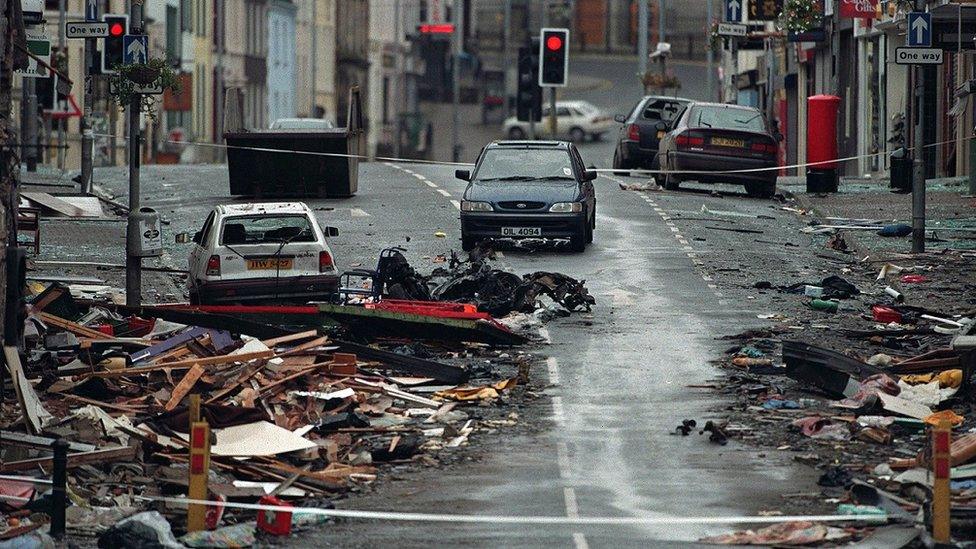
- Published23 July 2021
